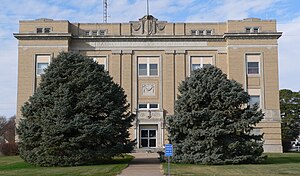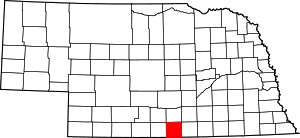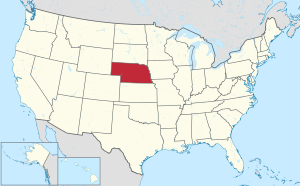Franklin County, Nebraska
Franklin County | |
|---|---|
 Franklin County courthouse in Franklin | |
 Location within the U.S. state of Nebraska | |
 Nebraska's location within the U.S. | |
| Coordinates: 40°11′N 98°57′W / 40.18°N 98.95°W | |
| Country | |
| State | |
| Founded | 1871 |
| Named for | Benjamin Franklin |
| Seat | Franklin |
| Largest city | Franklin |
| Area | |
| • Total | 576 sq mi (1,490 km2) |
| • Land | 576 sq mi (1,490 km2) |
| • Water | 0.2 sq mi (0.5 km2) 0.03% |
| Population (2010) | |
| • Total | 3,225 |
| • Density | 5.6/sq mi (2.2/km2) |
| Time zone | UTC−6 (Central) |
| • Summer (DST) | UTC−5 (CDT) |
| Congressional district | 3rd |
| Website | www |
Franklin County is a county in the U.S. state of Nebraska. As of the 2010 census, the population was 3,225.[1] Its county seat is Franklin.[2] The county was formed in 1867 and organized in 1871.[3][4] It was named after Benjamin Franklin.[5]
In the Nebraska license plate system, Franklin County is represented by the prefix 50 (it had the fiftieth-largest number of vehicles registered in the county when the license plate system was established in 1922).
Geography
According to the U.S. Census Bureau, the county has a total area of 576 square miles (1,490 km2), of which 576 square miles (1,490 km2) is land and 0.2 square miles (0.52 km2) (0.03%) is water.[6] The Republican River flows through the southern part of Franklin County.[7]
Major highways
Adjacent counties
- Kearney County - north
- Webster County - east
- Smith County, Kansas - southeast
- Phillips County, Kansas - southwest
- Harlan County - west
- Phelps County - northwest
Demographics
| Census | Pop. | Note | %± |
|---|---|---|---|
| 1870 | 26 | — | |
| 1880 | 5,465 | 20,919.2% | |
| 1890 | 7,693 | 40.8% | |
| 1900 | 9,455 | 22.9% | |
| 1910 | 10,303 | 9.0% | |
| 1920 | 10,067 | −2.3% | |
| 1930 | 9,094 | −9.7% | |
| 1940 | 7,740 | −14.9% | |
| 1950 | 7,096 | −8.3% | |
| 1960 | 5,449 | −23.2% | |
| 1970 | 4,566 | −16.2% | |
| 1980 | 4,377 | −4.1% | |
| 1990 | 3,938 | −10.0% | |
| 2000 | 3,574 | −9.2% | |
| 2010 | 3,225 | −9.8% | |
| 2015 (est.) | 2,985 | [8] | −7.4% |
| U.S. Decennial Census[9] 1790-1960[10] 1900-1990[11] 1990-2000[12] 2010-2013[1] | |||
As of the census[13] of 2000, there were 3,574 people, 1,485 households, and 1,021 families residing in the county. The population density was 6 people per square mile (2/km²). There were 1,746 housing units at an average density of 3 per square mile (1/km²). The racial makeup of the county was 99.24% White, 0.28% Native American, 0.06% Asian, 0.08% from other races, and 0.34% from two or more races. 0.64% of the population were Hispanic or Latino of any race. 63.5% were of German, 6.8% American, 6.6% English and 5.7% Irish ancestry according to Census 2000.
There were 1,485 households out of which 28.60% had children under the age of 18 living with them, 59.40% were married couples living together, 6.00% had a female householder with no husband present, and 31.20% were non-families. 29.20% of all households were made up of individuals and 16.00% had someone living alone who was 65 years of age or older. The average household size was 2.34 and the average family size was 2.87.
In the county the population was spread out with 24.50% under the age of 18, 4.50% from 18 to 24, 23.60% from 25 to 44, 23.50% from 45 to 64, and 23.90% who were 65 years of age or older. The median age was 43 years. For every 100 females there were 92.80 males. For every 100 females age 18 and over, there were 91.00 males.
The median income for a household in the county was $29,304, and the median income for a family was $34,958. Males had a median income of $26,192 versus $18,214 for females. The per capita income for the county was $15,390. About 9.70% of families and 13.20% of the population were below the poverty line, including 17.20% of those under age 18 and 9.40% of those age 65 or over.
Communities
Politics
| Year | Republican | Democrat | Other |
|---|---|---|---|
| 2012 | 72.4% 1,112 | 25.0% 384 | 2.6% 40 |
| 2008 | 69.5% 1,079 | 28.5% 442 | 2.0% 31 |
| 2004 | 74.5% 1,277 | 24.0% 412 | 1.5% 25 |
| 2000 | 71.7% 1,196 | 25.2% 420 | 3.2% 52 |
See also
References
- ^ a b "State & County QuickFacts". United States Census Bureau. Retrieved September 19, 2013.
- ^ "Find a County". National Association of Counties. Retrieved 2011-06-07.
- ^ Fitzpatrick, Lilian Linder (1925). Nebraska Place-Names. Lincoln: University of Nebraska Studies in Language, Literature, and Criticism. p. 60. Retrieved December 14, 2014.
- ^ Andreas, A. T. (1882). "Andreas' History of the State of Nebraska". The Kansas Collection. Retrieved December 14, 2014.
- ^ Gannett, Henry (1905). The Origin of Certain Place Names in the United States. Govt. Print. Off. p. 131.
- ^ "2010 Census Gazetteer Files". United States Census Bureau. August 22, 2012. Retrieved December 7, 2014.
- ^ Burr, George L. (1921). History of Hamilton and Clay Counties, Nebraska, Volume 1. S.J. Clarke Publishing Company. p. 110.
- ^ "County Totals Dataset: Population, Population Change and Estimated Components of Population Change: April 1, 2010 to July 1, 2015". Retrieved July 2, 2016.
- ^ "U.S. Decennial Census". United States Census Bureau. Retrieved December 7, 2014.
- ^ "Historical Census Browser". University of Virginia Library. Retrieved December 7, 2014.
- ^ "Population of Counties by Decennial Census: 1900 to 1990". United States Census Bureau. Retrieved December 7, 2014.
- ^ "Census 2000 PHC-T-4. Ranking Tables for Counties: 1990 and 2000" (PDF). United States Census Bureau. Retrieved December 7, 2014.
- ^ "American FactFinder". United States Census Bureau. Retrieved 2008-01-31.
- ^ "Dave Leip's Atlas of U.S. Presidential Elections". Retrieved 2015-01-09.

